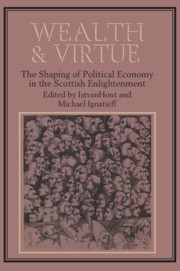Book contents
- Frontmatter
- Contents
- Preface
- List of abbreviations
- 1 Needs and justice in the Wealth of Nations: an introductory essay
- 2 Where had the Scottish economy got to by the third quarter of the eighteenth century?
- 3 Gershom Carmichael and the natural jurisprudence tradition in eighteenth-century Scotland
- 4 The Scottish professoriate and the polite academy, 1720–46
- 5 From applied theology to social analysis: the break between John Locke and the Scottish Enlightenment
- 6 The Scottish Enlightenment at the limits of the civic tradition
- 7 Adam Smith as civic moralist
- 8 The legal needs of a commercial society: the jurisprudence of Lord Kames
- 9 Cambridge paradigms and Scotch philosophers: a study of the relations between the civic humanist and the civil jurisprudential interpretation of eighteenth-century social thought
- 10 Adam Smith's ‘enduring particular result’: a political and cosmopolitan perspective
- 11 The ‘rich country–poor country’ debate in Scottish classical political economy
- 12 John Millar and individualism
- 13 Scottish echoes in eighteenth-century Italy
- Index
1 - Needs and justice in the Wealth of Nations: an introductory essay
Published online by Cambridge University Press: 05 June 2012
- Frontmatter
- Contents
- Preface
- List of abbreviations
- 1 Needs and justice in the Wealth of Nations: an introductory essay
- 2 Where had the Scottish economy got to by the third quarter of the eighteenth century?
- 3 Gershom Carmichael and the natural jurisprudence tradition in eighteenth-century Scotland
- 4 The Scottish professoriate and the polite academy, 1720–46
- 5 From applied theology to social analysis: the break between John Locke and the Scottish Enlightenment
- 6 The Scottish Enlightenment at the limits of the civic tradition
- 7 Adam Smith as civic moralist
- 8 The legal needs of a commercial society: the jurisprudence of Lord Kames
- 9 Cambridge paradigms and Scotch philosophers: a study of the relations between the civic humanist and the civil jurisprudential interpretation of eighteenth-century social thought
- 10 Adam Smith's ‘enduring particular result’: a political and cosmopolitan perspective
- 11 The ‘rich country–poor country’ debate in Scottish classical political economy
- 12 John Millar and individualism
- 13 Scottish echoes in eighteenth-century Italy
- Index
Summary
Since … according to Smith, a society is not happy, of which the greater part suffers – yet even the wealthiest state of society leads to this suffering of the majority – and since the economic system (and in general a society based on private interest) leads to this wealthiest condition, it follows that the goal of the economic system is the unhappiness of society.
Karl Marx, ‘Economic and Philosophical Manuscripts of 1844’No society can surely be flourishing and happy, of which the far greater part of the members are poor and miserable…
Compared, indeed, with the more extravagant luxury of the greater, [the labourer's] accommodation must no doubt appear extremely simple and easy – and yet it may be true, perhaps, that the accommodation of an European prince does not always so much exceed that of an industrious and frugal peasant, as the accommodation of the latter exceeds that of many an African king, the absolute master of the lives and liberties of ten thousand naked savages.
Adam Smith, Wealth of Nations (Bk I, Chs. I and VIII)No clear definition of the identity of political economy in eighteenth-century Scotland can be given unless an account is offered of the central questions which Adam Smith was trying to answer when he wrote the Wealth of Nations. This in turn requires that we should be able to understand the relation between Smith's concerns as a moral philosopher, as a professor of jurisprudence and as a political economist.
- Type
- Chapter
- Information
- Wealth and VirtueThe Shaping of Political Economy in the Scottish Enlightenment, pp. 1 - 44Publisher: Cambridge University PressPrint publication year: 1983
- 63
- Cited by

